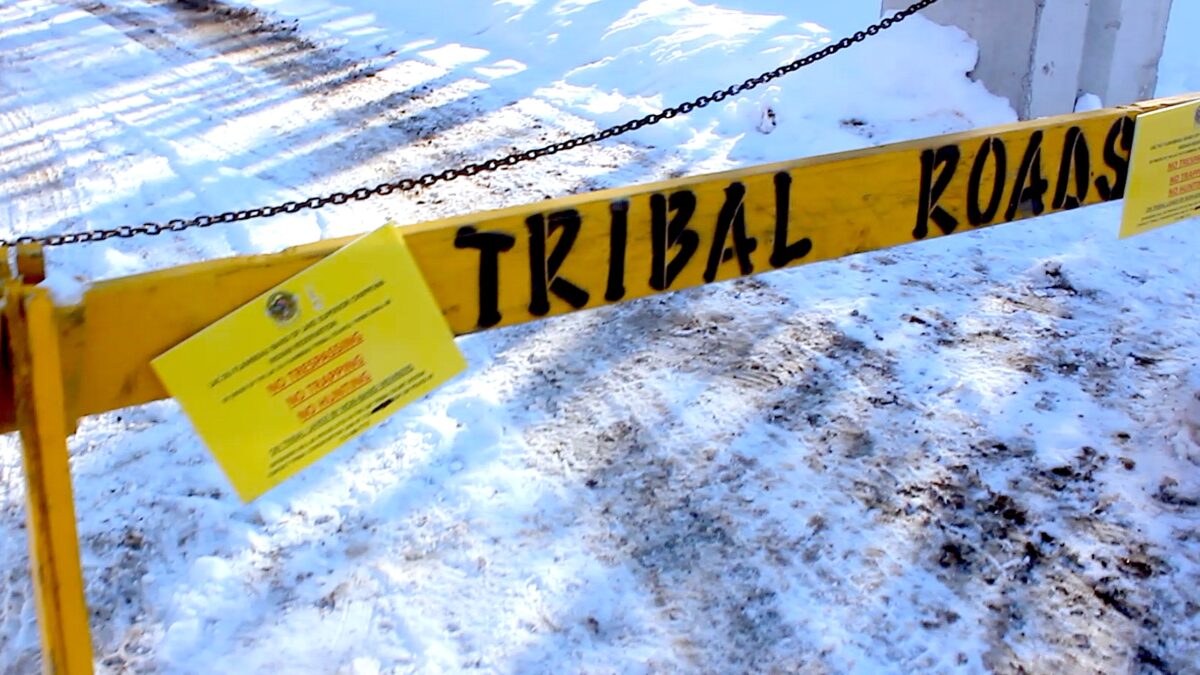In a plot line that seems ripped right out of the hit Paramount series “Yellowstone,” some 65 Wisconsin families are currently being held hostage by the Lac du Flambeau Band of Lake Superior Chippewa. The tribe has erected illegal barricades on the only roads that lead to their homes, preventing residents from entering and leaving. The only way out of the reservation is over frozen lakes that are quickly melting with the coming spring.
The yellow barricades and chained-together concrete blocks were set up 31 days ago over a bitter land dispute among two non-tribal title companies, the town of Lac du Flambeau, and the tribe. Meanwhile, racial tensions are rising, and many fear violence in a standoff that’s also shining a long-needed spotlight on the dysfunctional arrangement between Indian tribes and the U.S. federal government.
To open the roads for only 15 years, Tribal President John Johnson is demanding $20 million. It’s an amount Republican Rep. Tom Tiffany describes as tantamount to “extortion.” Tiffany also says it’s unlawful since all four roads in question receive federal funding through the Tribal Transportation Program. According to Tiffany, the tribe has received a total of $218 million in federal funds since 2013.
“I’m paying taxes to be illegally blockaded on my private land,” said Marsha Panfil. Panfil and her partner Mike Hornbostel own and run Hornwinkels Bear Stube, a historic bar and restaurant in the area. The pair has been considering closing their doors ever since they were blockaded because the only way in and out of their home is by crossing a frozen lake.
“I have to rent another house now so that I can continue to run my business,” said Hornbostel. “Crossing a [frozen] lake with the hours that we keep just isn’t conducive to sanity,” added Panfil.
Many of the blockaded homes are over 20 miles from the nearest grocery store and their residents’ jobs. Denny Pearson, another blockaded resident, crosses Ross Allen Lake every day to get to work, but he won’t be able to for much longer. “When the ice goes out, there’ll be no way to get to and from work,” Pearson told The Federalist. According to Pearson, it will likely only be safe to cross the lake for another two weeks before the ice becomes too thin. That’s when locals fear tensions will reach a breaking point.
The Dispute
When developers built homes for non-members of the tribe, they obtained right-of-way easements for parts of the roads that pass tribal land, but the easements expired more than a decade ago.
No one is denying that the tribe owns portions of the roads it’s barricading. “I think that the tribe has a legitimate position. They want to be compensated,” said Jeff Lang, a blockaded resident.
The question is whether the easements are worth $20 million. Interestingly, the tribe has barred anyone from viewing the roads’ rights-of-way appraisals. Tribal President Johnson claims the title companies could have paid much less had they “negotiate[d] in good faith” years ago. The attorney representing the non-tribal residents, however, says the tribe and the Bureau of Indian Affairs (BIA) were slow in responding and negotiating for years.
According to the residents’ attorney, “the Landowners have made two good faith settlement offers and two good faith requests to meet to resolve these road issues,” but have received no “substantive response from the Tribe.” The Federalist reached out to Johnson but did not hear back.
Law Enforcement Refuses to Act
Some of the residents knew that the easement to their property was expiring, while others had no idea there even was an easement. All the residents, however, were guaranteed by the town and the title companies that they would have access to and from their homes.
Hornbostel told The Federalist it’s the duty of the Lac du Flambeau Tribal Police Chief TJ Bill to remove the unlawful barricades. Bill has refused, though, and Hornbostel believes the chief is taking orders from Johnson. The Federalist reached out to Bill and asked why he hasn’t removed the illegal barriers but did not hear back.
“I’ve worked my entire life to buy a beautiful home on a lake, and now it’s worth zero,” said Hornbostel. “I can’t live there. I can’t sell it. It’s worth nothing. And that’s because the government won’t do anything, law enforcement will not enforce the laws, and our town is inept.”
Pawns on a Chessboard
The residents behind the barricades are, as Lang says, “pawns on a chessboard,” and they’re suffering. Don Pollard and his wife, who are both 88 years old, along with the other residents were given less than 24-hour notice that the roads were closing. The couple’s son had fallen through the ice a couple of years ago, and though he survived, they did not want to rely on crossing the frozen lake. The Pollards have consequently had to move in with their daughter in southern Wisconsin. Other elderly residents do not have anywhere else to go and remain behind the barricades.
Residents can’t work, buy groceries, receive mail, or vote unless they cross the lake. The tribe agreed to remove the barricades for doctor appointments and ambulances only. Residents say it can sometimes take the police department almost an hour to open the roads, which has become a major safety concern.
“There are people up here that are living with high degrees of stress and emotional stress,” said blockaded resident Dave Kievet. “I talked to one gentleman yesterday who’s a Vietnam veteran, [and] he said, ‘Dave, my stress level in Vietnam was at a 10. I’m at a 9.9 right now.’”
Nicole Beer, a trapped resident, says that once the ice melts, she and her husband will have no choice but to remove the barricades themselves. “We have lives and businesses,” she said. “I should have the freedom and the liberty to drive and get my own groceries and to have the garbage service that I pay for come in and pick up my garbage.”
Racial tensions are also growing. “It’s escalating very, very quickly to violence,” said Panhil. “Somebody threatened to burn all the [blockaded] houses down yesterday,” she revealed. “I sleep with a 95-pound lab and a 12 gauge shotgun now,” stated Hornbostel. “They threaten to burn our houses. They threatened our business. What am I supposed to do? I’m going to protect what’s mine.”
The situation is so combustible that The New York Times covered the story, but its reporting has only made things worse. The Times said the tribe is “on solid legal ground” but failed to mention that the barricades were illegally erected on publicly funded roads. The Times also reported that the tribe has “promised to allow ambulances and other emergency services to pass through if needed” but did not report how slow the process has been for law enforcement to remove the barricades when needed.
“With all due respect to The New York Times, I’m not sure they really understand the situation,” said Lang. “It’s a local problem,” he continued, warning against “extreme voices” inhibiting resolution.
Is It Stolen Land?
Non-tribal residents live on the reservation thanks to the 1887 Dawes Act, which broke up communally run reservations, allotting plots of land to each head of an Indian family. Since then, parts of the reservation have fallen into non-tribal ownership via sale, foreclosure, or enforcement of tax liens.
Many residents said they believe the tribe’s barricades are part of the native “#LandBack Movement,” in which natives try to recapture reservation land owned by whites to reassert their sovereignty.
Tribal member Melissa Christensen told The Federalist that while she sympathizes with the residents behind the barricades, they “shouldn’t have been able to buy [reservation] property to begin with.” But is the Lac du Flambeau reservation really the tribe’s land? After all, the Sioux Indians occupied the area until the Chippewa Indian ancestors of the Lac du Flambeau tribe fought a bloody war against the Sioux and forced them off their land.
“If they don’t want us on their roads, are they entitled to our roads?” asked Pollard. “They’re supposed to be another country, but doggonit, are they really another country? And if they are, do they want us to treat them like another country?” asked Pollard, referencing the millions of U.S. taxpayer dollars that flow into the tribe each year.
The System Is Broken
Blame for everything can ultimately be placed on the U.S. federal government and the defective, paternalistic tribal system it created. In the 1831 Cherokee Nation v. Georgia ruling, Chief Justice John Marshall stated that Native “relations to the United States resemble that of a ward to his guardian.” As a result, the U.S. government holds tribal lands in trust, managing them allegedly for the well-being of American Indians.
In reality, the regulations and bureaucracy inflicted on the reservations stifle American Indian innovation and prosperity. According to Tribal President Johnson, part of why the negotiations have taken so long is that the BIA ignored tribal leader questions and showed an “utter lack of recognition” of the tribe’s sovereignty.
But as Pollard suggested, the tribe isn’t really sovereign. Natives born on the reservations are born with American citizenship (and are eligible for Social Security, Medicare, welfare, and other benefits) because they are born on United States soil.
If the tribe were truly independent, tribal members would not be U.S. citizens, the reservations would receive no federal funding, the BIA wouldn’t exist, and the Lac du Flambeau tribe’s blockades would not be illegal. Since the tribe does receive federal funds and is demanding more and more every year, it is not sovereign and its decision to blockade its non-tribal neighbors is unlawful.
For the residents behind the barricades, their predicament is deeply complicated because the trust system is broken. The problems they face are not unique. More easements are set to expire in the area. As racial tensions and talk of reparations in America heat up, this combustible land-rights issue will also affect other reservations and non-Native Americans who live on tribal lands.








